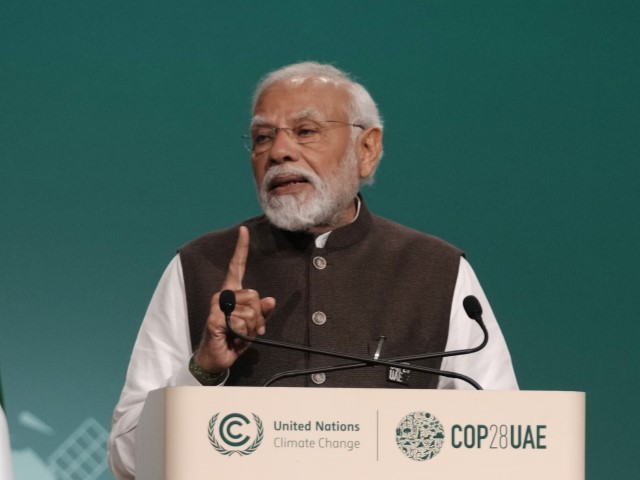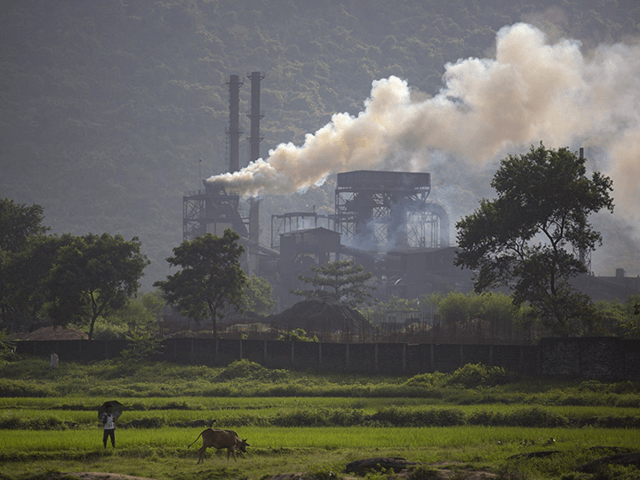India burns so much coal that it has an entire cabinet-level ministry devoted to coal. The Ministry of Coal informed the Rajya Sabha, the upper house of Parliament, this week that India will not be transitioning to any alternative form of energy in the “foreseeable future.”
The ministry said more mining and importing of coal will be necessary to meet the energy needs of the growing industrial economy.
The Hindustan Times noted that no one participating in the just-concluded winter session of Parliament acted like India’s promise at the COP28 climate conference to begin eliminating fossil fuels was sincere.
COP28, hosted by fossil fuel superpower the United Arab Emirates (UAE) in December, climaxed with an ostensibly “historic” agreement to “transition away from fossil fuels.” Stronger language that would have called for a more aggressive “phase out” was removed from the final joint declaration, but it was still the first climate conference agreement to explicitly discuss eliminating coal and oil on a near-future timetable.
India was one of 200 countries to sign the joint statement at COP28 but, a few weeks later, the Ministry of Coal explained to the Rajya Sabha that while India is expanding its use of renewables and alternative energy, coal will remain a major source of power for a very long time to come.

Indian Prime Minister Narendra Modi speaks during a plenary session at the COP28 U.N. Climate Summit, Friday, Dec. 1, 2023, in Dubai, United Arab Emirates. (Peter Dejong/AP)
“In India, the transition away from coal or Just Transition is not happening in the foreseeable future. Although India is pushing for renewable/non-fossil-based energy, but the share of coal in the energy basket is going to remain significant in years ahead to ensure affordable energy availability, accessibility, and energy security to enable sustainable development and poverty eradication,” the ministry said.
Coal Minister Pralhad Joshi said that while some government-run coal companies are shutting down over the next three to four years, their workers will be reassigned to private coal companies.
Joshi said coal production will increase by six to seven percent annually until hitting a peak of 1.5 billion tonnes in the 2030 fiscal year. He said more rail capacity will be added to handle the vast amounts of coal.
“India is the world’s fastest growing major economy and is expected to become the world’s third largest economy in the coming years. With the rapid industrial growth, the demand for energy has increased over the last decade and will continue to increase in the near future,” he said.
Vabihav Chaturvedi of the Council on Energy, Environment, and Water (CEEW) insisted that India is not “oblivious to climate change mitigation goals,” and plans to continue adding renewable energy at an even faster pace than increasing coal consumption.
“Meeting electricity needs of a fast growing economy necessitates a policy where variable renewable energy is complemented by stable base load coal in the near future, to ensure that the government delivers on its development agenda,” Chaturvedi said – a reasonable position, but not at all compatible with the extremely strict emissions goals demanded by the climate change movement.
“We cannot depend on imported oil and gas. Until we achieve our development needs, we will use coal,” said Indian Environment Minister Bhupender Yadav.
The Hindustan Times described the COP28 agreement as a “very carefully calibrated decision text,” which means developing economies like India were able to secure massive carve-outs for their prodigious use of fossil fuels.
Yadav boasted that India and other Global South developing nations were able to “thwart” bans on new coal power plants demanded by climate activists from developed nations.
In November, India turned away from an effort to transition to hydropower, because a relatively dry monsoon season caused hydro plants to come in far below their output goals – and India had to burn a record amount of coal to make up for the difference.

COMMENTS
Please let us know if you're having issues with commenting.